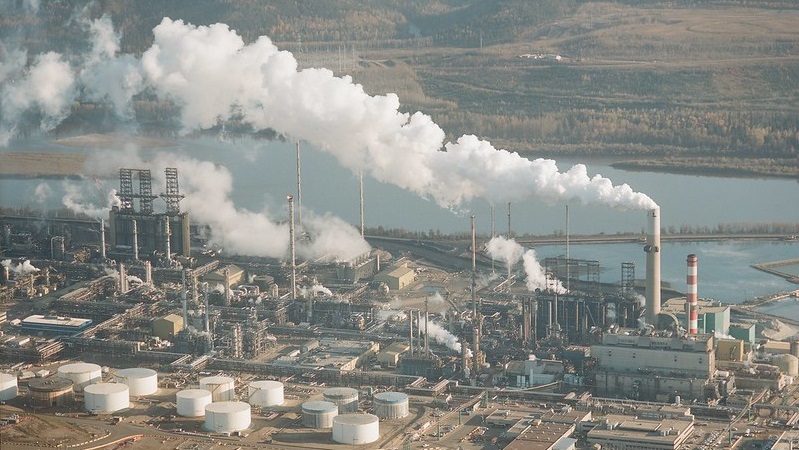An executive of one of Canada’s largest oil companies has been named a “climate champion” by the UK government to mark six months to the Cop26 climate talks in November.
A statement published on the UK government’s website said 26 “Canadian climate champions” had been identified “as exceptional individuals actively working to move Canada to net zero emissions”.
The “champions” were selected by Canada Climate Law Initiative (CCLI), a research initiative based out of the University of British Columbia, with input from the British High Commission in Ottawa. The list was revealed during a livestream event co-hosted by CCLI and the British High Commission last week six months ahead of the start of the climate talks in Glasgow.
Martha Hall Findlay, chief sustainability officer at Suncor, a company which produces crude oil from tar sands, made the list of people awarded with the title.
Suncor is one of Canada’s largest integrated energy companies and is expanding its oil production. The company has pledged to reduce the emission intensity of its oil production by 30% by 2030 but made no commitment to cut its emissions in absolute terms.
Suncor CEO Mark Little is a governor on the board of the Canadian Association of Petroleum Producers (CAPP), which has repeatedly opposed climate policy and lobbied to weaken Canada’s carbon tax on the oil sector.
California is the biggest producer in the world planning to go beyond oil
“Appointing oil company executives and bank executives heavily invested in oil and gas as climate champions is like appointing the tobacco industry to regulate cigarette advertising,” Tzeporah Berman, chair of the Fossil Fuel Non-proliferation Treaty campaign and the international programme director at Stand.Earth, told Climate Home News.
“Emissions from the production of oil and fracked gas are now the fastest and largest growing source of emissions in Canada. It’s too late to just talk about carbon storage and emissions intensity reductions,” she said.
“Canada wants to be a climate leader and is making some headway but until the Trudeau government acknowledges the need to wind down oil and gas production growing emissions will cancel out all our progress.”
The Canadian government was not involved in the initiative and there are no plans for the 26 “champions” to play a formal role at Cop26.
A spokesperson for the UK’s foreign commonwealth and development office told Climate Home the event was “part of the UK’s work to drive forward leadership on climate change, ahead of the Cop26 summit”. The UK’s Cop26 team did not respond to a request for comment.
Get climate news in your inbox: Subscribe to our weekly or daily newsletter
Jesse Bragg, spokesperson for campaign group Corporate Accountability, told Climate Home that any business that promises alignment with the Paris Agreement but still plans to extract fossil fuels into the future “is not a climate champion” but “an obstacle to progress”.
“In fact, the only way to truly ensure the UN talks are set up for success is to completely firewall the talks from the fossil fuel industry, not roll out the red carpet for them,” he said.
Valerie Chort, vice president for corporate citizenship and sustainability at the Royal Bank of Canada (RBC), was another controversial choice of “champion”.
RBC has financed fossil fuels projects to the tune of $160billion between 2016 and 2020, including more than $2bn for coal projects – the fifth largest fossil fuel funder in the world and the largest in Canada, according to a report by a coalition of NGOs published in March.
The findings led climate activists in Canada to put pressure on RBC to move away from fossil fuels.
Earlier this year, the bank pledged to reach net zero emissions by 2050 and to mobilise $500bn in sustainable finance by 2025.
Other people named as champions include Canada’s infrastructure minister and former environment minister Catherine McKenna, who launched the Powering Past Coal Alliance with former UK minister Claire O’Neill.
Environmentalist broadcaster David Suzuki and indigenous climate justice advocate Melina Laboucan-Massimo also made the list.
Cat Abreu, executive director of Climate Action Network Canada, told Climate Home that while there were some “true champions” on the list, “the criteria for what constitutes a ‘champion’ is quite unclear”.
“It appears that this list was named with the exclusive input of the CCLI, which is a nascent academic group focused on corporate responsibility that has so far not engaged Canada’s broad climate movement,” she said.
